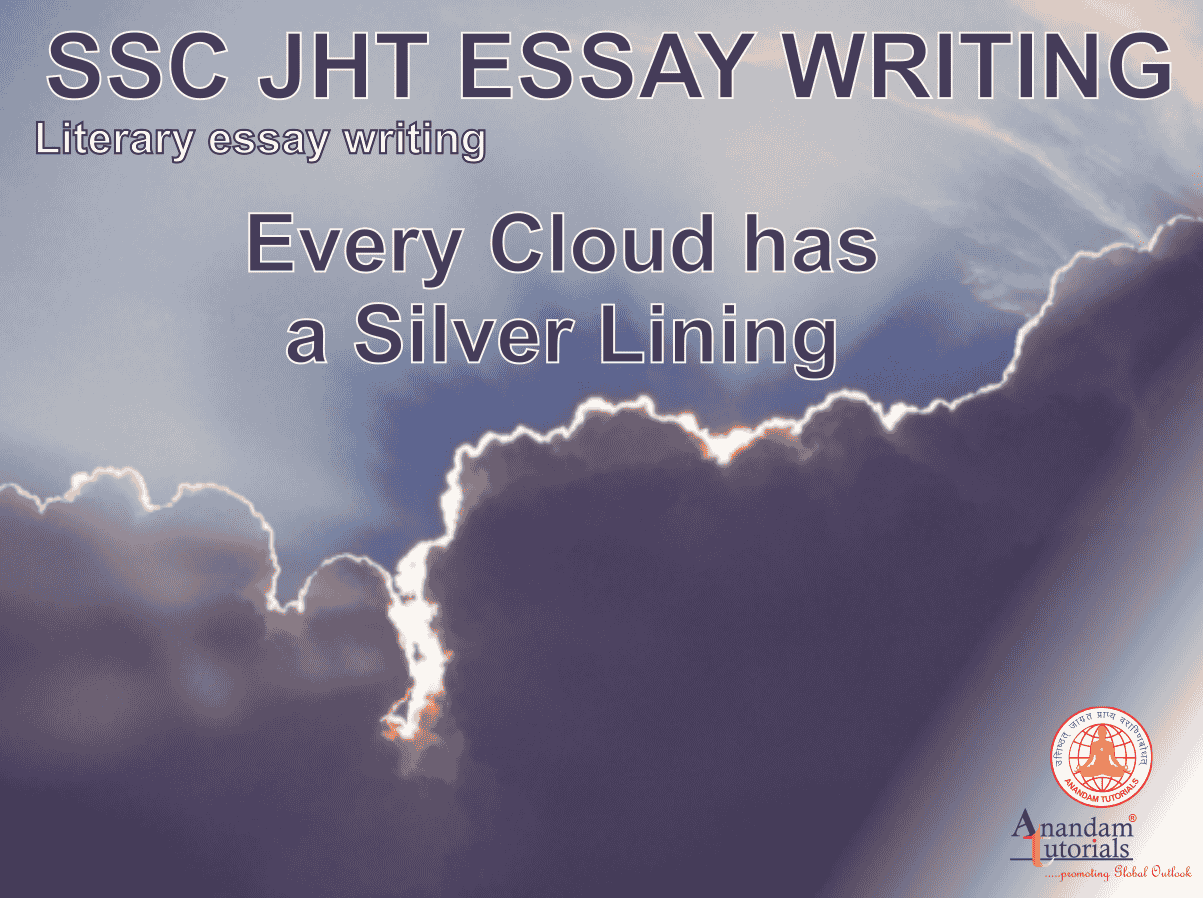प्रभावकारी निबंध लिखना एक कला है और कोई भी कला अथक परिश्रम से आता है। निबंध के लिए कई अति महत्त्वपूर्ण चीजों पर कार्य करने होते है, जैसे ज्ञान बढ़ाना, भाषा पर पकड़ रखना, शब्दकोश बड़ा रखना, ज्ञान को सटीक तरीके से एक तय शब्द-सीमा में रखना।
निम्नलिखित एक निबंध है जो अंग्रेजी साहित्य पर आधारित है। इसके प्रारुप पर ध्यान दें और तदनुरुप लिखने का प्रयास अपनी भाषा में करें -
Every Cloud has a silver lining
"Every cloud has a silver lining" is a timeless adage, suggesting
that even in the darkest of times, there is always hope and positivity. It
encourages optimism and reminds us that challenges, obstacles, and
disappointments often contain within them hidden blessings, opportunities, or
growth. This phrase paints a vivid picture of a cloud, a symbol of gloom and
uncertainty, which, when seen from the right perspective, reveals a bright
edge, indicating that even the most difficult situations carry potential for
positive outcomes.
Literary Background
The phrase "Every cloud has a silver lining" is deeply rooted
in literary tradition, and its origin can be traced back to the 17th century. This
phrase is believed to have first appeared in English literature in the 1600s,
attributed to the famous poet John Milton. In his Comus (1634), a masque
written for a performance at Ludlow Castle, Milton penned the lines:
"Was I deceiv'd, or did a sable cloud
Turn forth her silver lining on the night?"
In this line, Milton personifies the cloud, suggesting that even a dark
and foreboding cloud can reveal a bright and hopeful "silver lining."
Although Milton did not use the exact phrase we know today, his work planted
the seed for the metaphor that would later evolve into the familiar saying.
The concept of a silver lining speaks to the universal human experience
of suffering and resilience. Life is unpredictable and often presents us with
hardships that seem insurmountable—be it personal struggles, professional
setbacks, or even larger societal issues. However, history and literature are
full of examples where perseverance through adversity has led to unexpected
success or personal growth. The silver lining symbolizes that hope is always
present, even if it is not immediately visible.
In literature, this theme recurs frequently. Characters in novels,
poems, and plays often find themselves in bleak circumstances, only to discover
that those very difficulties lead to profound realizations, personal growth, or
unexpected opportunities. One classic example is in John Milton's Paradise Lost.
Although Adam and Eve fall from grace and are cast out of the Garden of Eden,
Milton emphasizes that their fall paves the way for redemption and salvation,
illustrating that even from the gravest sin, a path to grace can emerge.
Similarly, in Great Expectations by Charles Dickens, the protagonist Pip
faces numerous challenges and disappointments. His life is filled with
betrayals, misunderstandings, and dashed dreams. Yet, in the end, Pip gains
wisdom, humility, and a deeper understanding of what truly matters in life. His
trials, though painful, become the foundation for his moral and emotional
growth, which is the silver lining of his struggles.
The idea of a silver lining also resonates with modern times. Whether in
personal failures or global crises, we often witness how adversity can spark
innovation, collaboration, and progress. For instance, the COVID-19 pandemic
brought unprecedented challenges across the world, but it also accelerated
advancements in healthcare, technology, and remote work. People discovered new
ways to connect, work, and support one another, proving once again that
difficult times can bring about positive change.
On a personal level, this idea encourages us to adopt an optimistic
mindset. When faced with challenges, we often feel discouraged and demotivated.
However, if we look beyond the immediate struggle, we might find that these
experiences teach us invaluable life lessons, build resilience, or push us
toward opportunities we hadn’t previously considered. For instance, losing a
job might feel devastating in the moment, but it could open doors to new career
paths or the chance to develop skills that otherwise would have gone unnoticed.
In conclusion, "Every cloud has a silver lining" is a reminder of the transformative power of adversity. It encourages us to hold on to hope, even in the darkest times, because within every difficulty lies the potential for growth, renewal, and positivity. Life's challenges may seem overwhelming, but they are often the catalysts for our greatest achievements and self-discovery. Embracing this philosophy allows us to navigate life's ups and downs with grace, resilience, and an unshakeable belief in the possibility of brighter days ahead.
